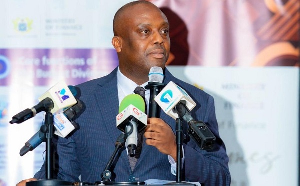The Ministry of the Interior is collaborating with the National Development Planning Commission (NDPC) to infuse the National Migration Policy, into the national long term development agenda, being pursued by the commission.
The Ministry spearheaded processes in the formulation of the National Migration Policy that is aimed at promoting a comprehensive and sustainable approach to migration management to optimise the potential of migration for accelerated national development.
Mr James Agaaga, the Deputy Minister of Interior, disclosing this on Thursday, said an estimated 3,500 Ghanaians reached Italy through irregular means of migration from January to June this year.
He was speaking at a sensitization workshop on the National Migration Policy, organised jointly by the Ministry in collaboration with Inter-Ministerial Committee on migration in Sunyani.
With support from the German Development Cooperation, the workshop was on the theme “counteracting irregular migration and security” and attended by security agencies, civil society organisations and representatives from Municipal and District Assemblies, drawn from Ashanti, Brong-Ahafo and Western Regions.
Mr Agaaga, who is the Member of Parliament for Builsa North, disclosed that 2,600 immigrants from Africa and the Middle East drowned in the Mediterranean this year, in their attempt to cross over to Greece and Italy.
He observed with concern that Europe had been experiencing one of the most significant influxes of migrants and refugees in its history.
This illegal travels, he noted, is pushed by civil war, terror and the promise of a better life, pointing out that drastic interventions were required from respective governments globally to end the trend.
Mr Agaaga emphasised that though migration contributed to national development, it also posed significant challenges “to us as a country due to the unavailability of reliable data”.
This according to the Minister had made it difficult to integrate migration into the country’s development agenda.
Mr Eric Opoku, the Brong-Ahafo Regional Minister, stressed that, Brong-Ahafo remained a major contributor to the number of Ghanaian youth, who travelled through irregular means to seek greener pastures in North Africa and Europe.
Available records, he said, indicated that most of those youth come from families that relied largely on agriculture which is dependent on the weather for food as well as those who engaged in petty trading to meet their basic needs.
Mr Opoku said research from the International Organisation for Migration (IOM) showed that in 2014, 5,017 migrants lost their lives whilst attempting to cross borders around the world.
Out of this number, 65 per cent of them are believed to have originated from Sub-Saharan Africa, he added.
Mr Samuel Amankwaah, the Director of Research, Ministry of the Interior, commended the GIZ/ IOM and the Centre for Migration Service at the University of Ghana and the Inter-Ministerial Steering Committee on Migration for their contributions to the formulation of the policy.
Regional News of Friday, 23 October 2015
Source: GNA












